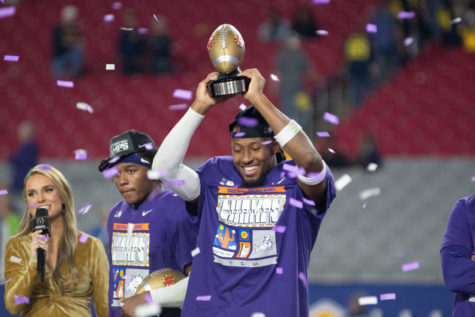College ranking numbers not as important as student body needs, values
Published Mar 2, 2012
All university students had to go through the dreaded college search to eventually land in Fort Worth. Even if choosing purple and white was the decision from the beginning, the research, standardized tests, meetings with the college counselor in high school and a flurry of campus visits all had their time and place.
The American university system is unique in its freewheeling competitiveness, and as a result brings stress and uncertainty to prospective students and their families.
One hinge of the whole process is college rankings. U.S. News and World Report, The Princeton Review and the bombastic claims of every university in their colorful marketing mailers can both educate and overwhelm.
Putting numbers to colleges to allow for a comparable, measurable decision-making process is helpful only if students and schools are responsible in reporting, producing and analyzing the information.
The fundamental purpose of college rankings is to describe the aspects of and outline the criteria necessary for each student to make a reliable and informed decision. Independent organizations such as The Princeton Review draft rankings on issues ranging from student-to-faculty ratio to the quality of dorms and parties.
A ranking system must try to predict what prospective collegians will value in the process.
Yet higher education can sometimes abuse and conform to the rankings system in a negative way.
Claremont McKenna College came under heavy criticism earlier this year for reporting misleading data to Kiplinger’s Personal Finance Magazine, which produces an annual list of best value colleges. Focusing on external indicators also favors well-established schools and research institutions while failing to reward sustainability or vision.
Used properly, rankings help colleges spread out in their niche. In the example of the Yale School of Management, however, a controversial new dean is changing the traditionally wide-ranging, ethics-driven focus of the curriculum in favor of a greater emphasis on more mainline, MBA- and private sector focused work.
The stated goal was to raise the school’s rank from No. 21 in the country. Yet Yale has always been known for its high proportion of business graduates working in non-profits and the government.
Rankings can apply pressure to conform and copy rather than specialize.
For students, rankings are helpful but limited. The “TCU’s Vision for the Future” email sent out by Chancellor Victor Boschini on Tuesday, which outlines the scope, goals and progress of the entire university community, is a prime example of an engaged and forward-thinking administration and a sense of on-campus energy that cannot be captured by a number or third-party website.
The chancellor’s message is well-worth a read, and the message of our school as a “world-class, values-centered university” is a stamp and brand visible here alone.
Rankings also do not properly weigh factors important in the lives of students, which is the real objective of a college education in the first place. The best answer to give GOP presidential candidate Rick Santorum’s critique of university life as for “snobs” is to seek out how to apply and enrich a college education for individuals.
Better methods of ranking put forward by SmartMoney and Washington Monthly include relevant factors such as the ratio of tuition to future salary, dropout rates and accessibility for low-income students in need of the great opportunity education affords them.
College rankings have their place and time, but their best advantage comes when they are considered alongside the individual needs and values of the student, the unique parts and spirit of a university’s brand and the background and future goals of each person passing through a campus. The university’s mission statement captures this well in its first three words: “To educate individuals.”
Pearce Edwards is a junior political science and history double major from Albuquerque, N.M.












